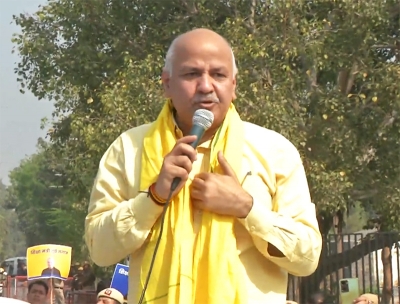
New Delhi, Feb 28 : After arrested Delhi ministers – Deputy Chief Minister Manish Sisodia and Satyendar Jain – resigned from the cabinet on Tuesday, the resignation letter of the former revealed that he told Arvind Kejriwal that it is the Chief Minister who is BJP’s real target, and not him.
Sisodia, who was arrested on Sunday and sent to CBI custody till March 5 on Monday, held 18 portfolios, including Finance and Education. He was also holding charge of Health, which was with Jain, who has been in jail for 10 months now.
Kejriwal has accepted their resignations.
“Me and my god know that all these allegations levelled against me are fake and nothing more than a conspiracy hatched by cowards who are afraid of Arvind Kejriwal’s politics of truth. I am not their target, but you (Kejriwal) are,” said Sisodia in his resignation letter to Kejriwal.
He added, “This is because today, not just the people of Delhi, but the whole country sees you (Kejriwal) as a leader who has a vision for India which can bring change in the lives of the people. Today, Arvind Kejriwal has become a symbol of hope in the eyes of crores of people across the country who are facing problems like economic crisis, poverty, unemployment, inflation and corruption. People know that unlike other leaders, Kejriwal does what he says.”
Sisodia also said that many FIRs have been registered against him and many more will follow.
Talking about his association with Kejriwal, Sisodia said, “They tried hard to force me to leave you. They even threatened me and lured me. When I did not bow down before them, they have arrested me and put me in jail. I am not even afraid of their jails. I am not the first person in the world to go to jail while fighting on the path of truth.”
The resignation letter also recounted Sisodia’s tenure as the Education Minister.
“I have worked honestly in various departments of the Delhi government. The prayers of lakhs of children studying in government schools of Delhi are with me. The love of their parents is with me. And the biggest thing is that I have the blessings of thousands of teachers who brought about a revolution in the field of education in Delhi,” he said.
Sisodia claimed that all the allegations levelled against him will be proven false and the truth will come out with time.
“But now that they have crossed all limits and put me in jail by hatching a conspiracy under false and baseless allegations, I wish that I should no longer hold the post of a minister,” he said.
“Being a minister in the Delhi government under your (Kejriwal’s) leadership and working for the people of Delhi is a matter of great fortune and pride in itself, but for the time-being, I am presenting my resignation to you through this letter. I request you to accept my resignation and release me from the responsibilities of the ministerial posts,” read the letter.






